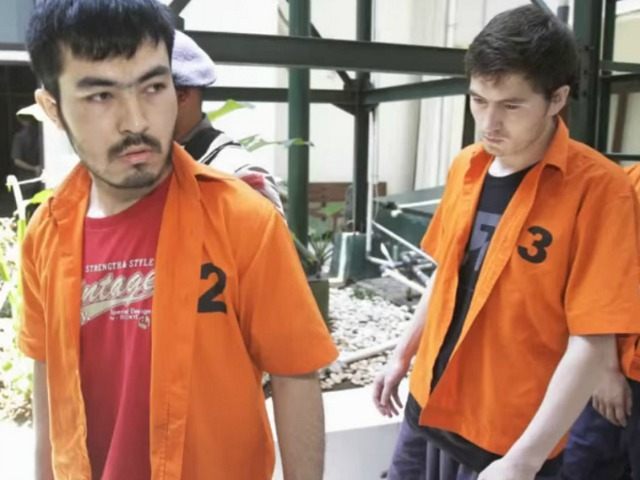The Congressional Executive Commission on China published its annual report on the state of affairs in China on Wednesday, condemning the state’s “disregard for human rights and the rule of law.”
“As documented in the new 2018 annual report of the bipartisan Congressional-Executive Commission on China, or CECC, the party unflinchingly continues to preserve its monopoly on domestic political power through state-sponsored repression, surveillance, indoctrination and brutality,” Sen. Marco Rubio (R-FL) and Rep. Chris Smith (R-NJ), co-chairs of the committee, wrote in an op-ed published in the Wall Street Journal on the eve of the report’s release.
The lawmakers wrote:
We must not forget that the expanding scope of domestic repression in China also directly affects an increasing number of Chinese citizens, stirring resentment, dissent, and even activism among them. At the heart of the CECC’s 2018 annual report is this enduring truth: Pressing for China’s adherence to universal standards advances not only American national security, economic interests, and moral values, but also the aspirations of Chinese citizens eager for peace, freedom and political reform.
The op-ed also cites another warning to China, delivered by Vice President Mike Pence in a major speech last week.
“Beijing is pursuing a comprehensive and coordinated campaign to undermine support for the president, our agenda, and our nation’s most cherished ideals,” Pence said.
Pence’s speech at the Hudson Institute also revealed U.S. intelligence on China’s efforts to influence American policies and politics ahead of the 2018 midterm and 2020 general elections.
Now, the more than 300-page commission’s report gives a detailed and damning overview of the Chinese Communist Party and the brutality of Chinese President and Party General Secretary Xi Jinping when it comes to human rights and the rule of law.
The executive summary begins by pointing out that the commission was established in 2000 with the hope that engaging China in everything from trade and economic interconnectivity to culture exchanges would result in a more liberalized China.
The report’s executive summary states:
Now, under the leadership of current Chinese President and Party General Secretary Xi Jinping, however, we see an ascendant and increasingly aggressive China, seeking to take center stage in the world, and in so doing, determined to shape new global norms on development, trade, the internet, and even human rights.
The Chinese government’s disregard for human rights and the rule of law most directly affects the Chinese people—as evidenced by the more than 1,300 active cases of political and religious prisoners contained in the Commission’s far from exhaustive Political Prisoner Database. The Commission’s Annual Report painstakingly documents rights violations in ethnic minority regions, religious freedom violations, harassment of rights defenders and lawyers, suppression of free speech, large-scale forced evictions, onerous restrictions on civil society and more—all of which are the markings of a repressive, one-party state.
The summary also notes specific human rights abuses, including as many as one million or more Uighurs and other ethnic minorities detained in ‘‘political re-education’’ camps in western China in what one international expert described as “a police state to rival North Korea, with a formalized racism on the order of South African apartheid.’’
The report points out, however, that the Communist threat is not only dangerous for the Chinese people, but its “authoritarianism at home directly threatens our freedoms as well as our most deeply held values and national interests.”
American citizens and journalists have been harassed and intimidated, according to the report’s executive summary, which concludes with an urgency of acting on the report’s revelations and includes a long checklist of what Congress and the federal government should do to achieve those goals:
As American policymakers revisit the assumptions that previously informed U.S.-China relations, and seek to chart a new path forward, it is vital that our foreign policy prioritizes the promotion of universal human rights and the protection of basic human dignity, principles the Chinese Communist Party is actively trying to redefine. Such pursuits have merit on their own accord, and they are also inextricably linked to vital U.S. national interests, including regional stability in the Indo-Pacific, the future of young and emerging democracies in our hemisphere, and the strength of our own civic institutions domestically.
The checklist includes advocating for political prisoners in China, holding officials accountable, promoting Internet freedom and countering foreign disinformation, supporting Tibet, and fighting against China’s brutal population control policies, including forced abortion.
One of the items on the list was the focus of a panel discussion on Thursday on Capitol Hill that included participants from the International Religious Freedom Roundtable, the United States Commission on International Religious Freedom (USCIRF), and representatives from persecuted religious minorities in China, including Falun Gong, the World Uyghur Congress and a Christian group, the Church of Almighty God.
The panelists described their members being arrested, tortured, and killed for their religious beliefs.
Tina L. Mufford, deputy director of research and policy at USCIRF, called on lawmakers to hit Chinese officials with sanctions directly linked to religious freedom abuses and for the U.S. State Department to designate China as a Country of Particular Concern because of its human rights abuses.
“I strongly encourage the State Department and Treasury to move forward on that,” Mufford said.
Some on the panel said China’s human rights abuses amount to “crimes against humanity” — a description also included in the commission’s report — and should be addressed accordingly.
The overreaching consensus of the discussion seemed to be that the United States government at every level, from diplomacy to foreign aid to trade talks, the issue of human rights and religious liberty should be “embedded” and a part of every discussion that takes place between the U.S. and China.
Grace Kang, counsel for China Aid, put it this way: “The current situation is, in a word, an emergency. It is truly a crisis.”
Follow Penny Starr on Twitter.

COMMENTS
Please let us know if you're having issues with commenting.